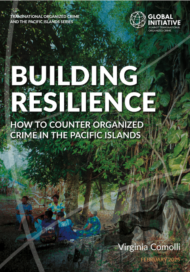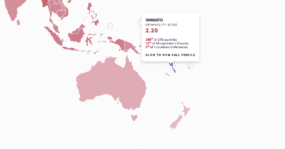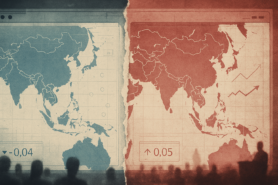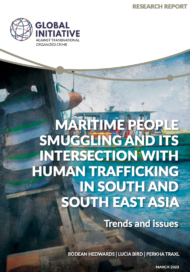Posted on 21 Nov 2025
In September 2025, the Solomon Islands government – China’s closest security ally in the Pacific region – announced the launch of the Solomon Islands–China Police Cooperation Model Communities, raising concerns among Western circles. This new effort is just the latest in a growing number of Chinese agreements transforming the Pacific policing terrain. Surveying this new landscape as it forms, one senses significant opportunity, but also a creeping concern around questions of compatibility and compromise.
In Pacific Island countries, where policing capacity is often challenged by geography, budgetary constraints and the growing threat of transnational organized crime, capacity support in the form of equipment, infrastructure and training from donors is not only welcome, but crucial. This kind of support has proliferated over the last decade, resulting in closer external involvement in law enforcement, and raising issues related to sovereignty, governance models and geopolitical influence.
One example of this type of collaboration is the Pacific Policing Initiative (PPI), launched in 2024 and funded by Australia, the region’s leading security partner. Australia and New Zealand are considered the Pacific’s traditional partners, with a long history of engagement and support, including having their officers appointed to leading positions within regional police forces. However, these efforts are increasingly taking place against a backdrop of strategic competition, particularly with China, whose own security engagement in the Pacific has expanded noticeably over the past decade. What was once considered straightforward technical cooperation now has significant geopolitical implications, making policing assistance an area where influence, sovereignty and governance models converge.
China’s law enforcement assistance in the Pacific focuses on two main pillars: capacity building and operational cooperation. The former includes donations of patrol vehicles, motorcycles and surveillance equipment, as well as new police buildings or data storage facilities. Support also takes the form of training courses for mid- to senior-level officers, covering topics such as cybercrime, forensics and disaster response. These often take place in China, with Mandarin language training included. In Fiji, China has donated equipment such as command vehicles and camera drones, as well as training to strengthen police capacity to combat drug trafficking and cybercrime. In Tonga and Vanuatu, China has provided vehicles, uniforms and equipment, and has offered training for police officers at Chinese academies.
In addition to capacity building, China’s Ministry of Public Security has also been cooperating with Pacific forces at an operational level. This has included joint patrols, the deployment of liaison officers and intelligence-sharing on crimes involving Chinese nationals, including organized crime.
At the same time, Chinese political objectives are sometimes included as part of the package. One partnership in particular has attracted significant attention. After ending its diplomatic recognition of Taiwan in favour of Beijing in 2019, Kiribati signed a policing cooperation agreement with China. The deal included a deployment of Chinese police experts to provide training and investigation support, particularly with regard to cybercrime and community policing. Although the arrangement was framed as an offer of technical expertise, it also cemented Beijing’s post-recognition footprint in Tarawa, the nation’s capital. In addition, in January 2024, a social media post by the Chinese embassy made reference to a Chinese police station in Kiribati. Both sides denied its existence, but the suggestion raised concerns, given that China has previously come under scrutiny for reportedly conducting covert and illegal policing operations in a range of countries, from South Korea to Spain.
Why the Pacific matters to Beijing
China’s policing assistance is thus not solely about fighting crime. Rather, it forms part of Beijing’s broader strategic agenda, including President Xi Jinping’s Global Security Initiative, announced in 2022. While the stated intention of this programme is to encourage ‘joint international efforts’ to promote stability, it also advances Beijing’s alternative model of security governance – one that is less concerned with liberal democratic norms and more focused on political security and state sovereignty.
Beijing’s objectives in the Pacific are multifaceted. They include gaining diplomatic leverage, monitoring and protecting the Chinese diaspora, and influencing regional governance. Specifically, law enforcement aid has been used to consolidate relationships following diplomatic shifts away from Taiwan, as in Kiribati and in Solomon Islands. While support often emphasizes the protection of Chinese nationals and investments, it also extends to the surveillance of the diaspora in order to deter dissent. Moreover, law enforcement assistance contributes to building a bloc of states that can back Beijing in multilateral forums and challenge initiatives seen as being led by the West.
Despite concerns from so-called traditional partners such as Australia, New Zealand and the US, as well as many analysts, Chinese assistance comes with tangible benefits. Many Pacific police forces operate on tight budgets, and equipment donations and training help to address these critical needs. Furthermore, Chinese officers have participated in criminal investigations involving Chinese nationals and syndicates in the Pacific, thereby boosting enforcement capacity, particularly with regard to cybercrime and online fraud, with which local teams have limited experience.
For states struggling to combat various forms of organized crime, assistance that is delivered rapidly and comes ostensibly with few constraints can be hugely appealing. Unlike Western partners, China does not suspend aid over human rights or governance concerns, which speaks to leaders who may wish to prioritize expediency over reform.
However, these advantages come with trade-offs that Pacific leaders should weigh carefully. The first is the model mismatch. Chinese policing is rooted in a paramilitary-style stability maintenance approach that often clashes with the community policing traditions valued in the Pacific. The concomitant risk is that local forces could shift towards more repressive tactics. Given that commissioners’ positions are often open to foreign applicants, it remains to be seen what changes may result from the potential appointment of candidates from countries that do not support community-led policing efforts. This contrast is further illustrated by, for example, the juxtaposition between Pacific Island police forces shaped by common law legal systems and elements of the Chinese system such as China’s People’s Armed Police Force, which sits directly under the Central Military Commission of the Chinese Communist Party.
Second, assistance that strengthens state surveillance capacity could potentially be used to monitor political opponents or civil society. It is worth noting that China’s Ministry of Public Security has previously been accused of misusing INTERPOL’s Red Notice system to target dissidents abroad. While cooperation between Pacific Island police forces and their Chinese counterparts has helped to capture fugitive Chinese citizens, the picture is complicated by far more complex relationships between the Chinese party-state and alleged Chinese criminals whose actions in some instances are seen to benefit party-state interests.
Third, although China’s aid is presented as unconditional, recipients may still feel compelled to align with Beijing diplomatically, especially with regard to Taiwan and regional governance issues. The political saga surrounding the 2025 Pacific Islands Forum Leaders Meeting in Honiara – the region’s most important political gathering – is illustrative of this. First Taiwan, and then all other partners and donors, were uninvited from discussions by Prime Minister Jeremiah Manele of Solomon Islands. This is just the latest example of the intense political pressure that Pacific nations face, and which influences their decision making.
For Pacific Island leaders, the key is agency. China’s support, like that of traditional partners, can help to fill urgent capability gaps, but it can also perpetuate uneven or deficient policing systems by entrenching dependency. Rather than importing policing models wholesale, assistance should be adapted to Pacific conditions and community-oriented traditions. In that vein, Australia’s PPI is conceived as a Pacific-led, Australian Federal Police-supported programme.
Pacific leaders have often skilfully handled engagement with larger powers, frequently playing on their strategic location and blue economies to advance domestic interests. Competing donor agendas around policing engagement present further opportunities, though not without significant hazards. Clear strategies, coordinated yet diversified partnerships and robust oversight can help Pacific nations harness external support to strengthen law enforcement while safeguarding their sovereignty, democratic values, human rights and regional stability.



